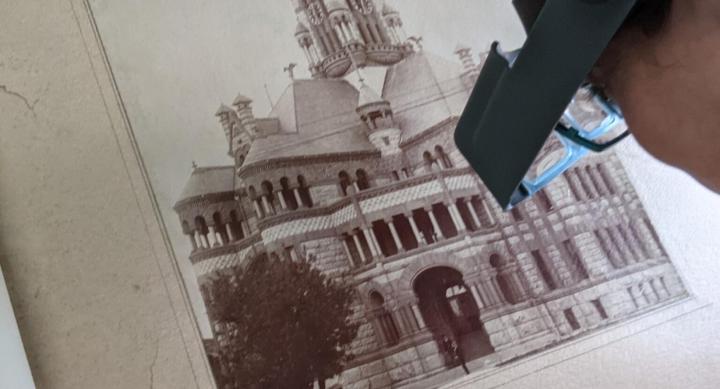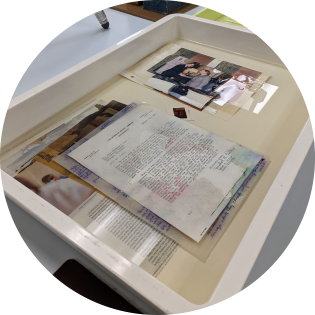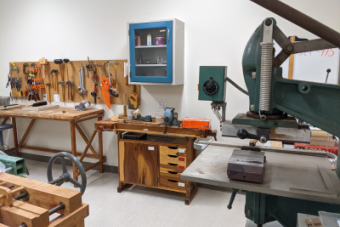Throughout human history, cultural heritage institutions such as libraries, archives, and museums have played a vital role in facilitating access to data, information, and technology over the decades and centuries.
The Informatics major concentration will equip students with the expertise to effectively manage, organize, preserve, and provide access to both print and digital collections, ensuring their long-term stewardship.

Cultural Heritage Informatics students acquire skills and knowledge that are highly sought after in data-intensive cultural heritage environments, including libraries, archives, museums, and scientific labs.

Core Competencies
Students in the Cultural Heritage Informatics major concentration will learn to:
- Curate, document, organize, and enable access to information items in physical, digital, and hybrid collections.
- Preserve the provenance of physical, digital, and hybrid collections; apply collections care to maintain physical collections and conservation to restore damaged items; and ensure digital preservation, including use of more durable formats, migrating materials across formats, and emulating digital environments as needed to preserve access.
- Advocate for communities by understanding their broad and diverse motivating goals and values, provide programs and services that benefit these users and communities, and engage in public debate surrounding information issues relevant to users and communities.
Cultural Heritage Informatics Major Concentration
Informatics majors learn the skills and knowledge required to collect, manage, and analyze data and information, and prepare for the great ethical responsibility that comes with these societally transformative roles.
Students develop an understanding of the complex social, cultural, and ethical context related to communicating with digital and social media tools, and to apply this understanding to creating digital solutions and technologies that are effective, inclusive, and responsive to the needs, values, and perspectives of people with many different lived experiences.
Cultural Heritage Informatics major concentration requirements include:
I 301 : Introduction to Informatics - 3 HRS
In this introductory course, students will explore the foundational theories, concepts, and challenges in Cultural Heritage Informatics, Health Informatics, Human-Centered Data Science, Social Informatics, Social Justice Informatics, and User Experience Design.
I 310C: Cultural Heritage Informatics - 3 HRS
In Introduction to Cultural Heritage Informatics, students will examine the fundamentals of managing, describing, organizing, preserving, and providing access to data and information in a wide range of technological forms.
I 310X: Additional Introductory Concentration Course - 3 HRS
In addition to taking the introductory course for their selected Informatics major concentration, students must also complete an introductory course in another Informatics major concentration:
- I 310M - Health Informatics
- I 310D - Human-Centered Data Science
- I 310S - Social Informatics
- I 310J - Social Justice Informatics
- I 310U - User Experience Design
I 320C: Advanced Topics in Cultural Heritage Informatics - 9 HRS
Students must complete nine credit hours in Advanced Topics in Cultural Heritage Informatics.
I 379C: Capstone - 3 HRS
Students pursuing the School of Information Honors distinction may substitute I 679H: Honors Thesis (6 HRS).
I Elective - 3 HRS
Students must complete three credit hours of Informatics elective coursework at the School of Information.
iSchool General Education Requirements - 27 HRS
- Informatics 302 - Academic Success in the Digital University (3 hours)
- Informatics 372 - Career Success in the Digital Organization (3 hours)
- Informatics 303 - Ethical Foundations for Informatics or equivalent (3 hours)
- Informatics 304 - Programming for Informatics or equivalent (3 hours)
- Informatics 305 - Research Methods for Informatics or equivalent (3 hours)
- Informatics 306 - Statistics for Informatics or equivalent (3 hours)
- Foreign Language: Beginning-level proficiency coursework, or the equivalent, in a foreign language (3 hours)
- Additional liberal arts OR science, technology, engineering, and math coursework (6 hours)

Undergraduate Informatics Program
Leverage insights from data and information technology to solve problems.

Academic Advising
Get advice and information to enhance your academic experience.

Information Preservation Lab
The Information Preservation Lab, managed by Sarah Norris, includes a large variety of tools and equipment for examination, analysis, photo documentation, and conservation treatment. A thorough sample collection, including more than 10,000 photographs and many other materials, is available for student use. Working in the labs provides iSchool students hands on experience with physical materials, adding another dimension to their education.